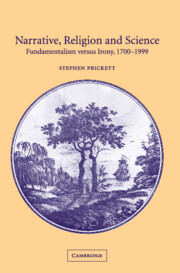Book contents
- Frontmatter
- Contents
- Acknowledgements
- Introduction: Arthur Dent, Screwtape and the mysteries of story-telling
- 1 Postmodernism, grand narratives and just-so stories
- 2 Newton and Kissinger: Science as irony?
- 3 Learning to say ‘I’: Literature and subjectivity
- 4 Reconstructing religion: Fragmentation, typology and symbolism
- 5 The ache in the missing limb: Language, truth and presence
- 6 Twentieth-century fundamentalisms: Theology, truth and irony
- 7 Science and religion: Language, metaphor and consilience
- Concluding conversational postscript: The tomb of Napoleon
- Bibliography
- Index
1 - Postmodernism, grand narratives and just-so stories
Published online by Cambridge University Press: 12 November 2009
- Frontmatter
- Contents
- Acknowledgements
- Introduction: Arthur Dent, Screwtape and the mysteries of story-telling
- 1 Postmodernism, grand narratives and just-so stories
- 2 Newton and Kissinger: Science as irony?
- 3 Learning to say ‘I’: Literature and subjectivity
- 4 Reconstructing religion: Fragmentation, typology and symbolism
- 5 The ache in the missing limb: Language, truth and presence
- 6 Twentieth-century fundamentalisms: Theology, truth and irony
- 7 Science and religion: Language, metaphor and consilience
- Concluding conversational postscript: The tomb of Napoleon
- Bibliography
- Index
Summary
POSTMODERNISM AND GRAND NARRATIVES
We have so far been using the word ‘narrative’ as if it had a clear and agreed meaning, but this is, of course, not so. For the French philosopher Jean-François Lyotard, for example, narrative not merely tells a story, but, of itself, constitutes a kind of ‘knowledge’ – a particular way of understanding the world.
Scientific knowledge does not represent the totality of knowledge; it has always existed in addition to, and in competition and conflict with, another kind of knowledge, which I will call narrative in the interests of simplicity … I do not mean to say that narrative knowledge can prevail over science, but its model is related to ideas of internal equilibrium and conviviality next to which contemporary scientific knowledge cuts a poor figure, especially if it is to undergo an exteriorization with respect to the ‘knower’ and an alienation from its user even greater than has previously been the case.
In contrast with the kind of ‘objective’ knowledge of the material world supposedly provided by science, for Lyotard, narrative provides an essentially subjective and personal view of things. We have within us all a personal ‘story’ which we tell ourselves, and which we constantly modify and alter in the light of experience. Indeed it has been argued that our very mental health and stability depends upon the kind of internal narrative we construct. A fractured and incoherent self-construction can be both symptom and cause of profound psychic dislocation.
- Type
- Chapter
- Information
- Narrative, Religion and ScienceFundamentalism versus Irony, 1700–1999, pp. 14 - 53Publisher: Cambridge University PressPrint publication year: 2002

